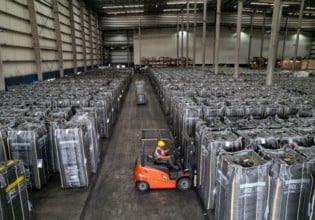PowerGenix Rechargeables Meet EU RoHS Requirements For Toxic Batteries
PowerGenix announced that it has met the European Union’s requirements for the Reduction of Hazardous Substances (RoHS), as well as the 2006 Battery Directive. PowerGenix’s line of rechargeables serve as high-cycle, high-power replacements for existing sealed rechargeable battery technologies, including nickel-cadmium which is being phased out by manufacturers and retailers in North America, the EU and Asia due to toxicity concerns.
The RoHS directive bans new electrical and electronic equipment containing more than agreed levels of toxic heavy metals such as lead, cadmium, mercury, and hexavalent chromium from the EU market. In parallel, the Battery Directive places even more aggressive restrictions on the use of cadmium and mercury. The general RoHS directive became mandatory in the EU during 2006 and is being adopted in California and is under consideration in parts of Asia.
PowerGenix’s batteries contain no lead, cadmium or mercury, common additives for electrode stabilization, which is said to present a cleaner environmental alternative to lead-acid and nickel-cadmium batteries. In addition to being non-toxic, nickel and zinc also allow for repeated recycling while still maintaining their physical properties and performance.
During lab testing at Summit Environmental Technologies, an independent analytical laboratory, PowerGenix’s battery cells were separated into multiple samples. Results showed that all components are well below concentrations required for compliance with both RoHS and the EU Battery Directive.
"It’s clear that nickel-zinc’s time has come. The recent move by Toys ‘R’ Us and Mattel to phase out nickel-cadmium batteries is a tangible indication that it’s not business as usual when it comes to cadmium and other toxic materials," explained Dan Squiller, CEO of PowerGenix. "We expect to see more companies, in all industries, begin to follow the trend of eliminating harmful materials from their products, leaving PowerGenix well-poised to replace 30-year-old nickel-cadmium technology with safe, non-toxic energy storage."






